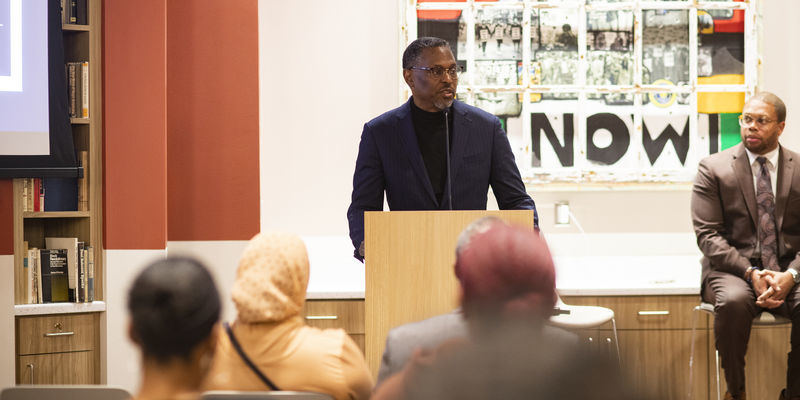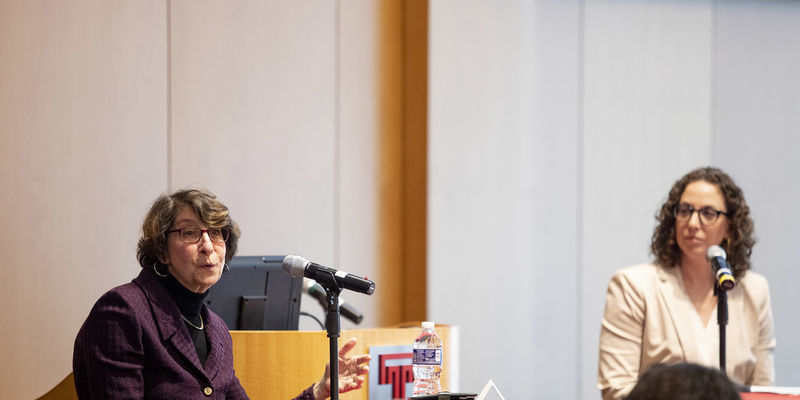Temple’s Center for Anti-Racism celebrates second anniversary
To mark the occasion, the center hosted a special discussion with Khalil G. Muhammad, author of Condemnation of Blackness: Race, Crime, and the Making of Modern America.

Two years ago, Temple University affirmed its commitment to fighting racism through focused efforts on advocacy, programming, research and training when it officially opened its Center for Anti-Racism.
Today, that mission is alive and well.
This week, the center celebrated its second anniversary when it hosted a special discussion with Khalil G. Muhammad, the Ford Foundation Professor of History, Race and Public Policy at Harvard Kennedy School and former director of the Schomburg Center for Research in Black Culture. The discussion was moderated by Timothy Welbeck, director of Temple’s Center for Anti-Racism.
The center’s vision was spawned in the summer of 2020 by Molefi Kete Asante, professor in the Department of Africology and African American Studies, and was strongly supported by members of the Temple community, including then-president Richard Englert. Following the murders of George Floyd and Breonna Taylor, America was facing a racial reckoning, and it was imperative for Temple to be a leading voice in the fight toward racial justice.
“This space was born during the summer of 2020 when America was facing a racial reckoning. Since then, we have seen an unreckoning of sorts, which makes our mission even more important,” said Welbeck during the opening remarks of the center’s two-year anniversary event. “Two years later, we have committed to doing the work. We want to have an impact across the neighborhood, across the city and across the nation, and we are doing just that.”
During the event, Muhammad discussed themes from his book Condemnation of Blackness: Race, Crime, and the Making of Modern America. Within the book Muhammad chronicles how, when and why modern notions of Black people as an exceptionally dangerous race of criminals first emerged. The book, which was first released in 2010, has since become one of the foremost academic examinations of these themes.
During the discussion, Muhammad recalled how even when there seems to be progress in solving the issues of racial inequity and injustice, historically, the United States often takes steps back. It is what is being seen now as some companies and organizations working to distance themselves from promises made related to diversity, equity and inclusion.
According to Muhammad, it is also something that emerged in the immediate aftermath of Barack Obama being elected president.
“There was a time, back when President Obama took office, where I thought, ‘If this presidency means something, then this book is a relic,’” Muhammad shared during the discussion. “But what we have seen since is that its lessons have become even more urgent.”
In closing, Muhammad encouraged attendees to not give up the fight while racism remains highly prevalent.
“There is no substitute for organization,” Muhammad said. “We have to organize in defense of our rights.”
Temple’s Center for Anti-Racism continues to do its part in the fight for equality. As the center enters its third year of existence, several new programs are planned in support of the center’s broader mission to use advocacy, programming, research and training to combat racism.
To that point, next year, the center plans to launch a diversionary program called Pathways to Potential: A Pilot Program for Justice-Involved Youth, which is designed to prepare program participants for matriculation to a post-secondary institution, success in entrepreneurship and/or successful entry into the workforce.
The program aligns with the center’s goal to support the fight against racism by offering informed, solution-based programming and services to those who reside in Temple’s neighboring areas. The program aims to mitigate the impacts of the poverty plaguing Philadelphians by offering participants the resources, skills, tools and training to overcome obstacles imposed by their environment.
“The Center for Anti-Racism is committed to fulfilling a mission to support the fight against racism through three pillars: scholarship, public education and community engagement,” said Valerie Harrison, Temple’s vice president for diversity, equity, inclusion and community impact. “Over the last year, the center hosted four academic conferences, partnered with city agencies to evaluate systemic racism in city institutions and developed strategies to mitigate its harm in Philadelphia. What is most exciting to me is that we are just getting started, and I am eager to continue to work to bring forth meaningful change, both here in Philadelphia and across the nation, in the years to come.”


